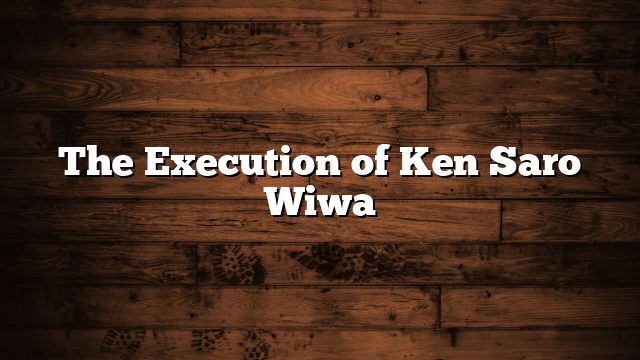The execution of Ken Saro Wiwa on November 10, 1995, remains one of the darkest moments in Nigeria’s history. The renowned writer and environmental activist was a thorn in the flesh of the Nigerian government, particularly the military regime led by General Sani Abacha. His campaign against the exploitation and degradation of the Ogoni people’s land by multinational oil companies made him a target of the government. Abacha’s government saw Saro-Wiwa as a threat to their interests and silenced him through the legal system.
Kenule Saro-Wiwa was born in Bori, Ogoniland in 1941, to a well-to-do family. He was educated in Nigeria and England, where he studied English literature and law. He became a successful businessman before turning to writing in the 1970s. He wrote several novels, plays, and poems that highlighted the social, economic, and environmental problems facing the Ogoni people. Saro-Wiwa’s writing drew attention to the exploitation of the Ogoni people’s land by multinational oil companies, particularly Shell Petroleum Development Company (SPDC).
In the 1990s, Saro-Wiwa became a prominent leader of the Movement for the Survival of the Ogoni People (MOSOP). MOSOP was formed in 1990 to fight for the rights of the Ogoni people, who had suffered years of neglect, environmental degradation, and social injustice. The movement used non-violent means to demand justice, including peaceful protests, marches, and rallies.
The Nigerian government, led by General Ibrahim Babangida, responded to the Ogoni people’s protests with force, resulting in the deaths of several protesters. The government also arrested and detained Saro-Wiwa and several other MOSOP leaders, accusing them of inciting violence. Saro-Wiwa was released after several weeks in detention, but the government’s actions only strengthened his resolve to fight for justice for the Ogoni people.
In November 1993, General Sani Abacha seized power in a bloodless military coup which took place in Nigeria on 17 November 1993 when he forced Interim President Chief Ernest Shonekan to resign. Shonekan had assumed the interim presidency on 26 August 1993, succeeding General Ibrahim Babangida as head of state.
Abacha’s government was known for its human rights abuses, including arbitrary arrests, detention without trial, and extrajudicial killings. Abacha’s government saw Saro-Wiwa and MOSOP as a threat to their interests, particularly their relationship with Shell, Nigeria’s largest oil producer.
In 1994, tensions between MOSOP and SPDC escalated when four Ogoni chiefs were killed during a peaceful protest against the oil company’s activities in Ogoniland. Saro-Wiwa and eight other MOSOP leaders were arrested and charged with the murder of the chiefs. The trial, widely regarded as a sham, was held before a military tribunal and lasted several months.
During the trial, Saro-Wiwa maintained his innocence, insisting that he and his co-defendants were being framed. He accused the government and Shell of conspiring to silence him and MOSOP’s campaign against the exploitation of the Ogoni people’s land.
Despite the widespread condemnation of the trial, the military tribunal found Saro-Wiwa and his co-defendants guilty and sentenced them to death by hanging. The verdict sparked international outrage, with many governments and organizations calling for clemency for the defendants. The United Nations, the European Union, and the Commonwealth of Nations imposed sanctions on Nigeria, including a ban on arms sales and diplomatic isolation.
On November 10, 1995, Ken Saro-Wiwa and eight other MOSOP leaders were executed by hanging. Saro-Wiwa was the first of the nine condemned Ogoni activists to be hanged in Port Harcourt. It took five attempts to hang Ken Saro-Wiwa before the Nigerian writer spoke his last words and his body went limp. “Lord take my soul, but the struggle continues,” were the anti-government activist’s final words before he died that Friday morning, blindfolded and dangling from a rope.
The execution was widely condemned by the international community, with many calling it a gross violation of human rights and justice. Shell, which had been accused of complicity in the trial, faced international boycotts and protests. The company denied any involvement in the trial but acknowledged that it had provided assistance to the Nigerian government in maintaining security in Ogoniland.
The execution of Ken Saro-Wiwa and his co-defendants sparked widespread protests and condemnation, both in Nigeria and internationally. Many Nigerians saw it as a blatant abuse of power by the military regime and a violation of the country’s constitution. It also raised concerns about the role of multinational corporations in developing countries and their relationship with governments.
In 2009, Shell agreed to pay $15.5 million to settle a lawsuit brought against it by the families of the Ogoni nine, including Ken Saro-Wiwa. The company did not admit liability but acknowledged that the trial had been deeply flawed and that it had not done enough to prevent the human rights abuses that occurred in Ogoniland.
The legacy of Ken Saro-Wiwa and the Ogoni nine continues to inspire people around the world to fight for justice and equality. Their story highlights the importance of protecting human rights, promoting environmental sustainability, and holding corporations accountable for their actions in developing countries.

